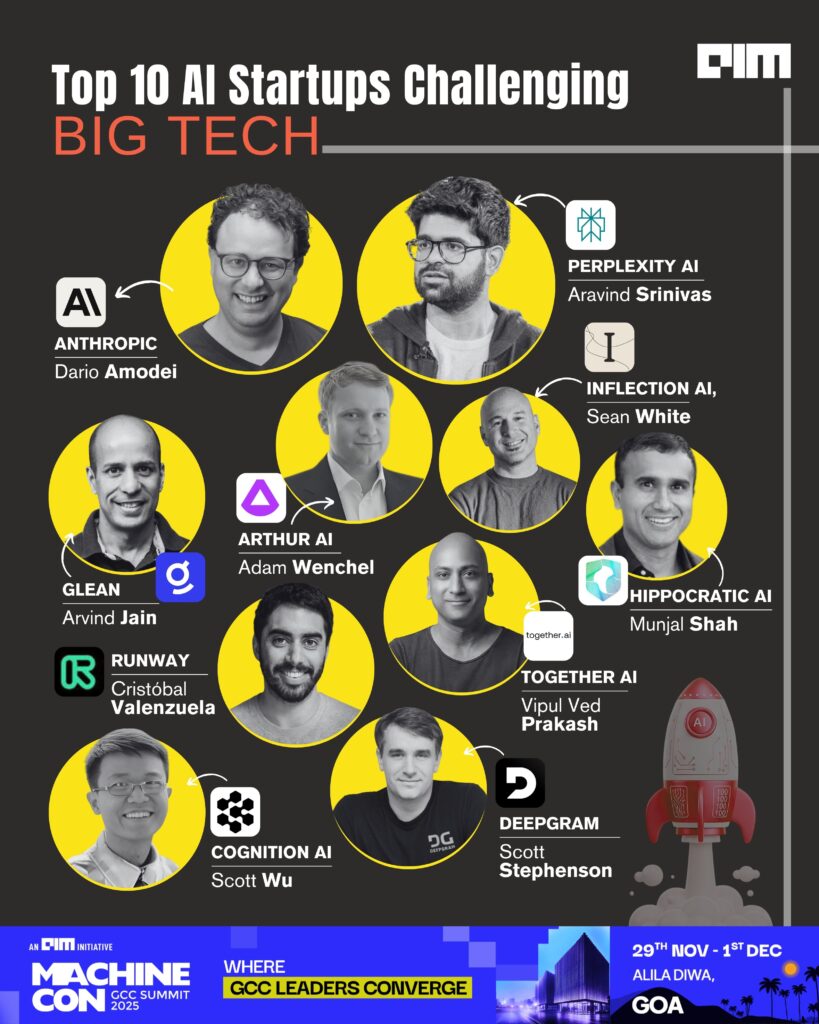For over a decade, Big Tech giants like Google, Microsoft, Meta, and Amazon have controlled the pace and direction of innovation. But in 2025, startups are rewriting those rules, building products that challenge, disrupt, and outright replace the foundations laid by giants.
What sets this new wave apart isn’t hype or speculative fiction, it’s verified traction and real-world impact. These companies are driving billions in investment, inventing new categories, and winning enterprise customers over. The founders are leveraging machine intelligence to create platforms that work smarter and put control back in the hands of users.
This shift is also a part of the trend where AI is moving away from experimental labs into daily life and critical business functions. Fuelled by the massive growth in private investment where AI investment alone exceeded $109 billion in 2024, these startups harness gen AI and other capabilities to boost productivity and close skill gaps.

1. Perplexity AI
Founded in 2022 by Aravind Srinivas, Denis Yarats, Johnny Ho, and Andy Konwinski, Perplexity AI is changing how people find and interact with information online by combining the power of AI with real-time web search.
Unlike Google’s traditional keyword-based approach, Perplexity’s answer engine combines LLMs and real-time web search to deliver cited, conversational, multimodal responses at high speed. Positioned as the “ChatGPT for the open web,” it is rapidly becoming a preferred alternative to Google Search and Bing for millions of users needing instant, verifiable information.
Perplexity provides instant answers without search clutter, directly opposing the ad-driven model central to Google’s ecosystem. Its interface is streamlined, privacy-conscious, and ready for enterprise use. By attracting millions of users and introducing AI-driven browser features, Perplexity threatens Google’s longstanding search and Chrome dominance.
2. Anthropic
Anthropic was founded in 2021 by former OpenAI researchers, including Dario Amodei, focusing on building AI agents that prioritize safety, explainability, and ethical alignment. Anthropic’s Claude models compete directly with OpenAI’s GPT-4 and Google Gemini.
The company’s research on “Constitutional AI” sets the standard for ethical, transparent model-building with extended context and robust safeguards. Anthropic’s emphasis on safety and its enterprise-first partnerships have drawn leading cloud providers and government agencies.
Unlike rivals, Anthropic builds in alignment protocols and risk checks within its LLMs, responding to growing regulatory demands that Big Tech has struggled to address. With billions in capital, Anthropic is positioned as OpenAI’s and Google’s most credible challenger on model safety and enterprise trust.
3. Inflection AI
Founded by DeepMind co-founder Mustafa Suleyman, and LinkedIn co-founder Reid Hoffman, Inflection AI focuses on developing emotionally intelligent chatbots designed as personal companions. Its flagship personal assistant chatbot, Pi, is designed for empathy, contextual understanding, and natural interactions, catering to users desiring more “human-first” AI conversations.
The company recently pivoted toward enterprise generative agents, integrating advanced dialog and process automation for business operations in direct competition to Google Assistant, Meta AI, and Azure Copilots. Inflection’s differentiator is emotional intelligence, creating interfaces that feel genuinely helpful and responsive.
Their platform’s adaptability and seamless integration with workflows demonstrate practical value, especially for customer service and digital transformation. Pi’s mature UX elevates Inflection above big tech’s more generic chatbots and virtual assistants.
4. Together AI
Together AI, founded by Vipul Ved Prakash, is driving open-source LLM adoption and collaborative cloud infrastructure for AI development. By letting any developer train, deploy, and host LLMs, Together AI is giving startups and enterprises control in a market historically locked down by Google, AWS, and Microsoft.
Together’s API-first approach dismantles barriers to model customization, removing reliance on proprietary clouds. Their infrastructure and managed stack democratize access, sparking competition in pricing, transparency, and data privacy that Big Tech has traditionally stifled.
Together AI also provides compliance-ready environments with strong privacy guarantees, addressing critical governance concerns which are rapidly becoming a top priority for regulated sectors.
5. Glean
Glean, founded by Google veteran Arvind Jain, is focused on solving enterprise search and knowledge management. Glean’s enterprise AI search system unifies workplace knowledge, connecting the dots across files, emails, chats, and databases.
It’s a direct competitor to Google Workspace, Microsoft 365, and Salesforce, allowing employees to find information faster than ever. Glean’s universal search platform is highly rated for speed, accuracy, and user-centric design. By prioritizing privacy and seamless deployment, it has won contracts that might otherwise default to Google Workspace or Microsoft 365, creating a new standard for workplace intelligence.
Glean supports over 100 app integrations, including Slack, Google Drive, and Salesforce, ensuring comprehensive coverage of enterprise data sources. Fast Company recognized Glean as the #1 most innovative company in applied AI for 2025.
6. Runway
Runway, founded by Cristóbal Valenzuela, is focused on AI-driven generative media, powering creative workflows for video, image, and design teams. Its tools automate visual effects, editing, and content production, domains previously dominated by Adobe, Apple, and Google.
Runway’s cloud platform democratizes visual AI and brings Hollywood-grade capabilities to everyday creators. Runway’s capabilities include text-to-video and image-to-video generation, allowing users to create unique video content simply by describing scenes or animating static images.
Beyond generation, Runway offers advanced editing tools such as background removal, motion tracking, color grading, and AI-powered lip-syncing, combining automation and creative control to speed up workflows. Their platform brings technology to anyone with a browser, slashing costs and outpacing Big Tech’s slow-moving creative suites.
7. Cognition AI
Cognition AI, founded by Scott Wu, Steven Hao, and Walden Yan, introduced the first truly autonomous AI software engineer, Devin. Devin can take instructions, write code, test solutions, and deploy finished applications. Cognition’s approach automates entire layers of the dev stack, a direct challenge to Microsoft’s (GitHub Copilot), Amazon’s, and Google’s dev tools.
Cognition’s platform also incorporates deep integration with popular developer tools and workflows, such as GitHub for source control, Jira for issue tracking, Slack for team communication, and Kubernetes for deployment orchestration.
This seamless integration allows businesses and startups to adopt AI-driven development with Devin without disrupting their existing processes or toolchains, ensuring smooth collaboration and productivity gains. Scott Wu’s team is redefining code productivity for both startups and enterprises, offering the kind of speed and scale only seen in Big Tech’s top internal projects.
8. Deepgram
Founded by Scott Stephenson, Deepgram builds world-class speech recognition and voice analytics infrastructure for developers, enterprises, and governments. Its next-gen platform delivers high accuracy even with noisy audio, challenging the voice AI offerings of Google, Microsoft Azure, and AWS.
By providing flexible APIs and custom model training paths, Deepgram vastly outperforms Big Tech’s off-the-shelf voice solutions in adaptability and accuracy. Their transparent pricing and data privacy policies have attracted major enterprises away from Google Cloud Speech-to-Text and Azure Cognitive Services.
With over 200,000 developers building on its API, and partnerships spanning startups to Fortune 500 firms, Deepgram is making a major push in voice AI.
9. Arthur AI
Arthur AI provides model monitoring and governance agents helping enterprises ensure the fairness, robustness, and reliability of AI models in production. Founded by Adam Wenchel in 2018, Arthur’s platform detects bias, monitors model drift, and supports compliance initiatives. By prioritizing client control and real-time model governance, they’re undermining the opaque compliance products offered by AWS, Google, and Microsoft.
Its agents integrate with diverse ML pipelines, enabling businesses to maintain AI integrity and align with ethical standards and regulatory frameworks. Over 100 enterprises use Arthur AI to maintain trustworthy AI governance.
Additionally, Arthur AI distinguishes itself with its cloud-agnostic architecture, allowing integration across all major cloud providers and on-premise systems. Its platform offers customizable dashboards, alerts, and explainability features, empowering AI teams to diagnose and remediate issues swiftly.
10. Hippocratic AI
Hippocratic AI focuses on clinical-grade large language models for triage, diagnosis, and patient support. Prioritizing regulatory compliance, transparency, and patient safety, Hippocratic addresses healthcare’s toughest AI challenges, facing off against Google Health and Microsoft Nuance.
Founded by Munjal Shah, Hippocratic’s emphasis on evidence-based, regulated, and fully transparent AI directly conflicts with Big Tech’s push into healthcare solutions that often lack clinical oversight. By working with hospitals, insurers, and regulators, Hippocratic AI is raising the bar for safety and efficacy in medical AI.
Their proprietary Polaris Constellation architecture powers safety-focused generative AI agents that assist with triage, diagnosis support, medication adherence, post-discharge follow-ups, wellness coaching, and administrative healthcare workflows. The company has established partnerships with major health systems and insurers, such as Universal Health Services (UHS) and KPMG, to deploy AI agents that reduce clinician workload and improve patient outcomes.










